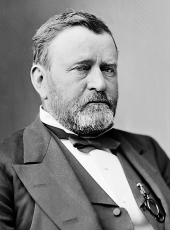To the Senate of the United States:
I return herewith without my approval Senate bill No. 692, entitled "An act to amend chapter 166 of the laws of the second session of the Forty-third Congress."
The objections to affixing my signature to this bill may be found in the report, which accompanies this message, of the Chief of Engineers of the Army to the Secretary of War.
U. S. GRANT.
WAR DEPARTMENT,
Washington City, June 28, 1876.
The PRESIDENT:
SIR: I have the honor to return herewith Senate bill No. 692, "to amend chapter 166 of the laws of the second session of the Forty-third Congress," and beg to invite your attention to the report of the Chief of Engineers dated the 27th instant, copy inclosed, and for the reasons stated in said report it is believed the bill should not become a law.
Very respectfully, your obedient servant,
J.D. CAMERON,
Secretary of War.
OFFICE OF THE CHIEF OF ENGINEERS, June 27, 1876 .
Respectfully returned to the honorable the Secretary of War.
"An act to aid in the improvement of the Fox and Wisconsin rivers, in the State of Wisconsin, " approved March 3, 1875, contains the following clause:
"In case any lands or other property is now or shall be flowed or injured by means of any part of the works of said improvement heretofore or hereafter constructed, for which compensation is now or shall become legally owing, and in the opinion of the officer in charge it is not prudent that the dam or dams be lowered, the amount of such compensation may be ascertained in like manner," etc.
The dams referred to in the above clause are at the outlets of Lake Winnebago, known as the Neenah or Menasha channels of the Lower Fox River.
The officer of the Department of Justice appointed under the provisions of the act referred to to represent the interests of the United States in legal proceedings "for flowage damages hereinbefore described," acting apparently under the assumption that because the dams in question had not been lowered it was the opinion of the officer in charge that they should not be lowered, has had such surveys, investigations, etc., made as were deemed necessary by him to protect the interests of the United States, and under this action it is understood that, at the instance of claimants, judges of the circuit court have appointed commissioners to decide on the amount of compensation due, and the judges have fixed the rate of compensation the commissioners are to receive. These commissioners are not appointed at the instance of the United States.
In this way the awards for damages have already been made to the amount of $70,000, and ultimately a much larger sum will be claimed to be due from the United States.
The officer of engineers in charge of the improvement of the Fox and Wisconsin rivers reports that the dams which have occasioned the flowage were not constructed by the canal companies, and are not at all necessary for the purposes of navigation, and so far as that is concerned could not only be lowered, but entirely dispensed with.
They were built by private parties solely for their own use and profit and for waterpower purposes, and have raised the water level and caused the flowage, for which they should be held liable.
In view of the preceding facts, and for the additional reason that the subject of the liability of the United States is now being investigated by the Department of Justice, it is respectfully suggested that the inclosed act to amend chapter 166 of the laws of the second session of the Forty-third Congress (S. 692) should not become a law.
A. A. HUMPHREYS,
Brigadier-General and Chief of Engineers.
Ulysses S. Grant, Veto Message Online by Gerhard Peters and John T. Woolley, The American Presidency Project https://www.presidency.ucsb.edu/node/204708

